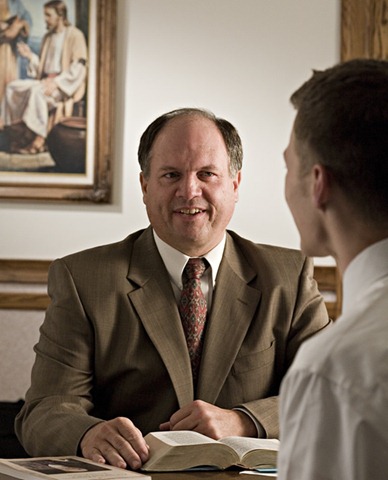Scriptures teach us, “Judge not, that ye be not judged” (Matthew 7:1). And we are further admonished, “For with what judgment ye judge, ye shall be judged: and with what measure ye mete, it shall be measured to you again” (Matthew 7:2). Therefore, when a brother or sister has been found guilty of any transgression – from the smallest to the most serious – we must do all that we can to help them return to the fold in good standing.
Whom the Lord Loves, He Chastens
As young children, whenever we misbehaved it often became necessary for our father to discipline us. At times the discipline may have seemed a bit severe or unfair, but our father always reassured us that it was because he loved us that it was necessary at times to discipline us in order to correct our behavior. In the same way, our loving Heavenly Father disciplines us whenever we commit a transgression. The scriptures teach us in Hebrews 12:6-11,
For whom the Lord loveth he chasteneth, and scourgeth every son whom he receiveth. If ye endure chastening, God dealeth with you as with sons; for what son is he whom the father chasteneth not? But if ye be without chastisement, whereof all are partakers, then are ye bastards, and not sons. Furthermore we have had fathers of our flesh which corrected us, and we gave them reverence: shall we not much rather be in subjection unto the Father of spirits, and live? For they verily for a few days chastened us after their own pleasure; but he for our profit, that we might be partakers of his holiness. Now no chastening for the present seemeth to be joyous, but grievous: nevertheless afterward it yieldeth the peaceable fruit of righteousness unto them which are exercised thereby.
Church Discipline and Repentance
 In The Church of Jesus Christ of Latter-day Saints, whenever a member has committed a transgression, he is able to talk with his bishop, branch president, or stake president who can help him overcome the transgressions in his life through a process called repentance. Those who are serving missions may speak with their mission president who is there to help them overcome their transgressions.
In The Church of Jesus Christ of Latter-day Saints, whenever a member has committed a transgression, he is able to talk with his bishop, branch president, or stake president who can help him overcome the transgressions in his life through a process called repentance. Those who are serving missions may speak with their mission president who is there to help them overcome their transgressions.
For more serious transgressions such as serious violations of civil law, spouse abuse, child abuse, adultery, fornication, rape, incest, and apostasy, formal Church discipline is often required. This formal discipline is begun when a presiding priesthood leader determines through prayer and revelation that it is necessary to hold a disciplinary council. It should be noted that the “purposes of disciplinary councils are to save the souls of transgressors, protect the innocent, and safeguard the purity, integrity, and good name of the Church.”
Such formal Church discipline may include restriction of Church membership privileges or a loss of Church membership, also known as excommunication. Excommunication is rare and is considered as a final means of resolution. Before a pronouncement of excommunication, all things are carefully and prayerfully taken into consideration in order to help a member who has transgressed to remain a faithful, active member of the Church.
During the proceedings of a disciplinary council, prayerful counsel is offered to the member for whom the council is being held. It becomes the responsibility of the member who has transgressed to act upon the counsel that is given to help him work through the repentance process and to regain his good standing in the Church. Excommunication is usually sought after counsel has been given and the transgressor willingly refuses to accept and follow the counsel which had previously been given.
The Church of Jesus Christ Responds to Questions Regarding Discipline
In response to the many questions received recently from the news media regarding Church discipline, The Church of Jesus Christ of Latter-day Saints has issued the following statement:
The Church is a family made up of millions of individuals with diverse backgrounds and opinions. There is room for questions and we welcome sincere conversations. We hope those seeking answers will find them and happiness through the gospel of Jesus Christ.
Sometimes members’ actions contradict Church doctrine and lead others astray. While uncommon, some members in effect choose to take themselves out of the Church by actively teaching and publicly attempting to change doctrine to comply with their personal beliefs. This saddens leaders and fellow members. In these rare cases, local leaders have the responsibility to clarify false teachings and prevent other members from being misled. Decisions are made by local leaders and not directed or coordinated by Church headquarters.
Actions to address a person’s membership and standing in their congregation are convened after lengthy periods of counseling and encouragement to reconsider behavior. Ultimately, the door is always open for people to return to the Church.
Excommunication is not necessarily an End
 Careful note should be taken of the final line in the statement, “Ultimately, the door is always open for people to return to the Church.” The statement made by The Church of Jesus Christ should help to shed a light of hope and understanding on the often misunderstood subject of excommunication. Excommunication from the Church does not have to signify an end to all things even though Church privileges are taken away. As stated, the door is always open and people who have been previously excommunicated can return to the Church.
Careful note should be taken of the final line in the statement, “Ultimately, the door is always open for people to return to the Church.” The statement made by The Church of Jesus Christ should help to shed a light of hope and understanding on the often misunderstood subject of excommunication. Excommunication from the Church does not have to signify an end to all things even though Church privileges are taken away. As stated, the door is always open and people who have been previously excommunicated can return to the Church.
One person wrote the following in the comments of Jana Riess’ article Are we looking at a Mormon purge?, which helps to clarify the definition of excommunication as it applies to The Church of Jesus Christ of Latter-day Saints:
Excommunication is not irretrievably permanent, and it’s actually meant to be a beginning and not an end. Although there are serious consequences that go along with it (related to ordinances and gifts thereof, names on records of church, holding callings, etc), people who are excommunicated are not disposed of nor are they out of the community. People for whom that action is invoked can (and often do) attend church weekly and church activities, receive home and visiting teachers, associate with members, and meet intensively and regularly with their bishop. (In this way, excommunication may differ quite dramatically from the way the same word is used in other traditions.) They are by no means thrown away or spiritually dead, and we are to remain without judgment of them and welcome them in our community just as we would anyone else.
Elder M. Russell Ballard remarked:
Church disciplinary action is not intended to be the end of the process—rather, it is designed to be the beginning of an opportunity to return to full fellowship and to the full blessings of the Church. Priesthood leaders try hard to be sensitive to the disciplined person’s needs for understanding, encouragement, counsel, and assistance. They work to see that he or she has regular visits with his or her bishop; that the person has mature, caring home teachers or other specially assigned individuals; and that his or her family receive the attention, counsel, and fellowship they need during this difficult time.
The desired result is that the person will make whatever changes are necessary to return fully and completely to be able to receive the marvelous blessings of the Church. When the person has progressed to that point, his or her current bishop or stake president has the authority to convene a new disciplinary council to consider what action needs to be taken—even if the person is now living in a new ward or stake or if a new bishopric or stake presidency is now serving.
After the rebaptism of a person who has not been endowed in the temple, his or her membership record shows the original baptism date, with no reference to the excommunication. A man who previously held the priesthood but was not endowed should generally be ordained to his former priesthood office. Again, his membership record will show his original ordination date, with no reference to excommunication.
The Healing Streams of Mercy and Love
 As a former Stake High Council member, and a former member of two Bishoprics as both Second and then First Counselor, I have had the opportunity to be a part of disciplinary councils. It was my experience then, and is my sincere belief now, that disciplinary councils are not held merely to discipline a person for the transgression which he or she has committed, but rather that person is viewed and treated as a special soul of worth, a son or daughter of a loving Heavenly Father.
As a former Stake High Council member, and a former member of two Bishoprics as both Second and then First Counselor, I have had the opportunity to be a part of disciplinary councils. It was my experience then, and is my sincere belief now, that disciplinary councils are not held merely to discipline a person for the transgression which he or she has committed, but rather that person is viewed and treated as a special soul of worth, a son or daughter of a loving Heavenly Father.
The council is begun with prayer asking for the Lord’s guidance and direction in attending the affairs of the council, and no decision is made as to the outcome of the hearing until the presiding priesthood leader and his counsellors have sought the Lord for guidance and inspiration.
Furthermore, it has been my experience as I have been called upon to participate in such councils, that the overarching message that is conveyed to the transgressor is that they are loved by their Heavenly Father and by the members of the Church, even on the rare occasion that a person is excommunicated. In all instances, regardless of the outcome of the council, the healing streams of mercy and love continue to flow.
About Keith L. Brown
Keith L. Brown is a convert to The Church of Jesus Christ of Latter-day Saints, having been born and raised Baptist. He was studying to be a Baptist minister at the time of his conversion to the LDS faith. He was baptized on 10 March 1998 in Reykjavik, Iceland while serving on active duty in the United States Navy in Keflavic, Iceland. He currently serves as the First Assistant to the High Priest Group for the Annapolis, Maryland Ward. He is a 30-year honorably retired United States Navy Veteran.



